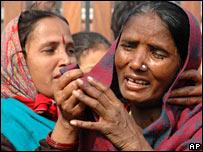|
|
|
|
|
|
|
Amigos w/ Common Interests
|
|
|
|
|
|
|
|
|
|
|
|
|
|
|
|
|
|
<<
View Prev Image
|
|
|
|
View Next Image >>
|

Category: Innocence |
|
|
Grief in India
BBC PHOTO
No place for poor in India
Sanjeev Srivastava, India editor of the BBC's Hindi service, wonders about the reaction in India to a horrendous serial killing case.
As the rich and the well-heeled made preparations to ring in 2007 in style across a new, shining India, a sleepy, poor housing area - Nithari - almost ruined their party.
Almost.
An initial wave of revulsion swept through the country after details of the mass killings in Nithari village of Noida - a suburb of the Indian capital, Delhi - unfolded like one grotesque sequence after another of a horror film.
But after a while, most Indians came to see the killings as simply a gory crime committed by one or more sick individuals.
In the end, most parties and festivities went ahead as planned.
But surely Nithari should have evoked a different response. Why?
Is it because at least 17 young women and children were killed over a period of one and a half years in this village, no more than 18 miles (30kms) from the capital Delhi and right next to one of modern India's most prosperous and upcoming districts, Noida?
Or because the police took so long to crack the case?
Or because they still really have no clue about the motive of this ghastly crime which came to light after the remains of some of the victims were found in a sewer?
As for the first point, violent death in many cases, involving much larger numbers, is not so rare in India.
As far as police inefficiency is concerned, that should come as no big surprise for most Indians.
So why should Nithari have provoked a different response?
Because this case illustrates best the most barbaric and basic truth about the Indian state.
That it has failed the country's poor.
Nithari, in fact, is an example of how the poor and the weak have just no place in the Indian system.
Where else in the world could children be disappearing like they were in Nithari for more than a year without the police registering a case and investigating, even when the parents had alerted the police about their missing offspring?
Where else in the world would the courts have had to intervene just to ensure that the police did start investigations?
Where else in the world could the post-Nithari headlines have been hijacked by visits of senior politicians and different political parties trying to score debating points?
It is also interesting how the Indian media has been sucked into covering the relatively more mundane, but sensational issues, about the case... like whether it is a case of sexual abuse or cannibalism or could the killings be related to organ trade?
The ingredients of the "truth serum" given to the two suspects and details about narco-analysis and polygraph lie detector tests seem to be occupying more space in media than the real issue which is...
How could it all have happened in the first place?
How did the Indian system become so completely insensitive and indifferent to the poor?
Could a Nithari have happened in a rich or middle-class neighbourhood?
It is difficult to imagine.
Just a few weeks ago when a rich software company CEO's son was abducted from Noida - not more than 3 miles (5kms) from Nithari - the case hogged the limelight 24x7 and the police worked overtime to solve it.
The result? The childe [sic] eventually returned home safely.
Speaking to a BBC Hindi service show, one of India's most celebrated police officers - Kiran Bedi - said the Nithari case was an example of how for the common man in the country there is no police or justice system.
"The system needs to be completely overhauled and wide-ranging reforms are needed in the police structure," she said.
She is right.
But only police reforms will not do.
The entire system - and attitudes - desperately need to be reformed.
Indians - and of late quite a bit of the world as well - keep talking about the new India's economic prowess and potential... of its 8-9% growth rate, how India produced more millionaires than China last year, and how India may become the world's largest economy after the US and China in the next few decades.
It will be nice if these predictions come true.
Many Indians are also convinced that is the way the Indian story will unfold.
Nothing wrong with this optimism - it makes them confident and proud.
But can many Indians say with same degree of optimism that there will not be another Nithari when India does realise its dreams?
All Indians know the answer.
Story from BBC NEWS:
http://news.bbc.co.uk/go/pr/fr/-/2/hi/south_asia/6255511. stm
Published: 2007/01/12 16:11:14 GMT
|
|
|
|
|
|
| |
|
|
|
|
|
|
|